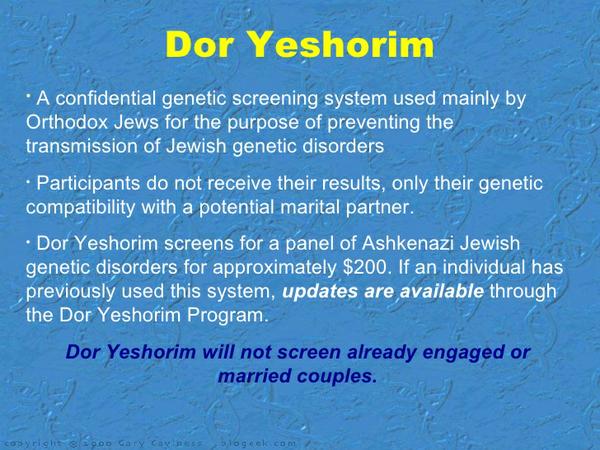Below I will post purpose and reasons for DY testing as provided by the Chicago Center for Jewish Genetic Disorders and Children's Memorial Hospital.
Recently the question has been posed, when should one check for DY compatibility - before considering any suggestions or only after both sides have done their due diligence and are ready to proceed to date?
In my opinion, DY checking should only be done once all due diligence has finished and both families are ready to proceed. The exception would only be in the circumstance where both sides are aware that a specific genetic problem may be present. Otherwise, protocol is not to check DY every time a suggestion is made.
When DY numbers have been exchanged, both sides have committed to start the process to date each other and should not entertain other suggestions until after dating.
__________________________________________________________________________________________________________________________
Chicago Center for Jewish Genetic Disorders and Children's Memorial Hospital
1. What Your Congregants Should Know Chicago Center for Jewish Genetic Disorders & Children’s Memorial Hospital Jewish Genetic Disorders:
2. In general, 1 in 3-5 Ashkenazi Jews is a carrier for at least one of these disorders. Some disorders are more common than others- carrier frequencies range from 1 in 15 to 1 in 149. Ways in which the disorders differ:
Chicago Center for Jewish Genetic Disorders and Children's Memorial Hospital
3. Genetics
A gene is made of DNA, the basic genetic material. It carries the chemical instructions to make all the proteins in the body has the instruction or “code” for one particular protein. We have two copies of most genes.
4. What is a genetic mutation and how does it lead to disease?
6. Facts about carriers of recessive genetic disorders:
8. Why does ethnicity determine disease risk? Founder Effect:
16. A decrease in the number of affected individuals DOES NOT mean a decrease in carrier frequency.
17. Why would someone choose not to be screened?
Recently the question has been posed, when should one check for DY compatibility - before considering any suggestions or only after both sides have done their due diligence and are ready to proceed to date?
In my opinion, DY checking should only be done once all due diligence has finished and both families are ready to proceed. The exception would only be in the circumstance where both sides are aware that a specific genetic problem may be present. Otherwise, protocol is not to check DY every time a suggestion is made.
When DY numbers have been exchanged, both sides have committed to start the process to date each other and should not entertain other suggestions until after dating.
__________________________________________________________________________________________________________________________
Chicago Center for Jewish Genetic Disorders and Children's Memorial Hospital
1. What Your Congregants Should Know Chicago Center for Jewish Genetic Disorders & Children’s Memorial Hospital Jewish Genetic Disorders:
2. In general, 1 in 3-5 Ashkenazi Jews is a carrier for at least one of these disorders. Some disorders are more common than others- carrier frequencies range from 1 in 15 to 1 in 149. Ways in which the disorders differ:
- Age of onset – many have early childhood onset
- Degrees of severity – many are lethal
- Treatment options – very few have effective treatment
- Genetic testing is now available for almost all the disorders listed later
- Ashkenazi Jewish genetic disorders represent a varied group of conditions
Chicago Center for Jewish Genetic Disorders and Children's Memorial Hospital
3. Genetics
A gene is made of DNA, the basic genetic material. It carries the chemical instructions to make all the proteins in the body has the instruction or “code” for one particular protein. We have two copies of most genes.
4. What is a genetic mutation and how does it lead to disease?
- A change in the DNA of a particular gene can result in an alteration of the genetic instructions.
- Some genetic alterations are not harmful but are part of our genetic differences (for example, hair color and eye color).
- An alteration in a gene can lead to disease by affecting the function of that gene.
6. Facts about carriers of recessive genetic disorders:
- Every individual is estimated to be a carrier of 6-8 genes which can produce disease.
- Carriers are generally not affected because they have a fully functioning copy of the disease gene.
- Only when both copies of the gene are not functioning will an individual be affected with the disease.
- Most carriers will have no family history of that genetic disorder.
- Certain ethnic groups have a higher risk for certain genetic conditions than the general population?
- Northern European Caucasians: cystic fibrosis
- African Americans: sickle cell disease
- Mediterranean ancestry: thalassemia
8. Why does ethnicity determine disease risk? Founder Effect:
- A few individuals migrated and founded a new, isolated population.
- Within this group there was a founder who carried a genetic mutation.
- The group was then, by chance, different from the population that the settlers came from.
- Beta-thalassemia
- Familial Mediterranean fever
- Glycogen storage disease, type III
- G6PD deficiency
- Bloom’s syndrome
- Canavan disease
- Cystic fibrosis
- Familial dysautonomia
- Fanconi anemia, group C
- Gaucher disease, type I
- Mucolipidosis IV
- Niemann-Pick disease, type A
- Tay-Sachs disease
- Dihydrolipoamide dehydrogenase deficiency
- Familial hyperinsulinism
- Glycogen storage disorder, type 1a
- Joubert syndrome
- Maple syrup urine disease
- Nemaline myopathy
- Spinal muscular atrophy
- Usher syndrome type 1F
- Usher syndrome type 3
- Hereditary breast and ovarian cancer syndrome (Dominant inheritance)
- Torsion dystonia (Dominant inheritance)
- There is no set panel of Ashkenazi Jewish genetic disorders. Different labs screen for different panels of these disorders. Diseases listed in italics are explicitly recommended by American College of Medical Genetics (ACMG). The others on the right fit ACMG criteria except the last four. Please see the Chicago Center website, www.jewishgenetics.org, for more detailed information about the disorders.
- Carrier screening is available for disorders more common in the Ashkenazi Jewish population by looking for specific mutations that are most common in this group.
- Individuals with at least one Ashkenazi Jewish grandparent, or suspected Ashkenazi ancestry, should be offered screening.
- Screening should still be offered to a Jewish individual even if his/her partner is not biologically Jewish, as none of these disorders are exclusive to the Jewish population.
- Sperm or egg donation
- Preimplantation genetic diagnosis
- Prenatal diagnosis by amniocentesis or chorionic villus sampling
- Adoption
- Choosing to accept the risk
- The Tay-Sachs Model
- One of the most successful screening programs for genetic disease
- Strong participation from the Jewish community
- Involvement of religious leaders
- Programs have been able to nearly eliminate Tay-Sachs disease from the Jewish population
16. A decrease in the number of affected individuals DOES NOT mean a decrease in carrier frequency.
17. Why would someone choose not to be screened?
- Lack of awareness about Tay-Sachs and other Ashkenazi Jewish diseases
- Some people assume that there is no need to be tested if:
- Parents were screened for Tay-Sachs— but we now screen for many more disorders.
- Marrying someone who is not Jewish— but testing is still recommended for the Jewish partner.
- Cost—Many insurance plans do not cover carrier testing.
- Fear of stigmatization/effect on relationships
- A confidential genetic screening system used mainly by Orthodox Jews for the purpose of preventing the transmission of Jewish genetic disorders
- Participants do not receive their results, only their genetic compatibility with a potential marital partner.
- Dor Yeshorim screens for a panel of Ashkenazi Jewish genetic disorders for approximately $200. If an individual has previously used this system, updates are available through the Dor Yeshorim Program.
- Dor Yeshorim will not screen already engaged or married couples.


